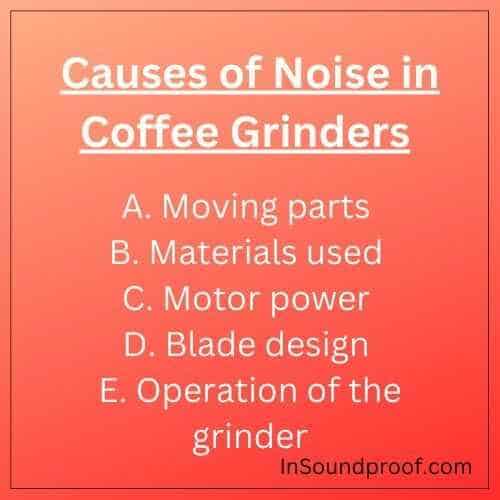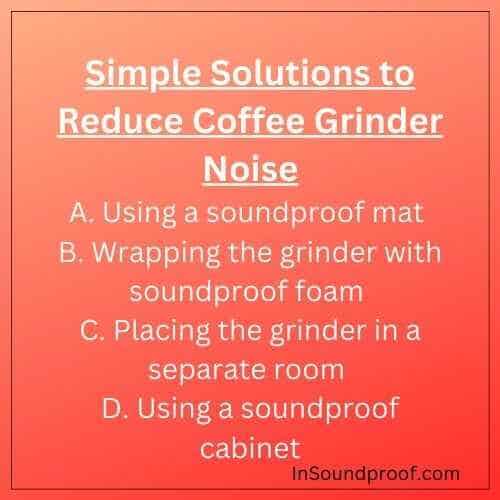Are you a coffee lover who enjoys making your cup at home but can’t stand the loud sound of your grinding blades? If so, you may wonder how to make your coffee grinder quieter.
Unfortunately, the sound of a grinder can be quite annoying for many people, especially if their home is already noisy.
Excessive sound or regular noise can cause physical and psychological effects in the short and long term. Studies have found that long-term exposure to high sound levels can lead to decreased mental well-being, difficulty sleeping, and hearing loss. In the short-term, loud noise can disrupt concentration, increase stress levels, and even cause headaches.
So it’s worth investing in ways you can reduce the noise your grinder creates.
Fortunately, some simple tricks and tips help you reduce the noise your grinder emits every time you use it – here’s how to make coffee grinder quieter!
Soundproofing: Soundproofing options for Sliding Doors

Table of Contents
Why Do Coffee Grinders Make Noise?

The screeching sound emitted by coffee grinders may seem unavoidable, but it shouldn’t have to be. It’s not just the sound of a modern necessity; it can and should be minimized by us.
The noise source when using a coffee grinder is the friction caused as the moving blade contacts the coffee beans. As beans are pushed against and spun by the blade, heat and vibrations are created as two hard materials push up against each other at high speed. This physical action produces an audible sound that we often overlook until uninvited guests arrive unexpectedly!
You can alleviate this built-up noise with techniques used at home or on the go to make your coffee experience much more enjoyable.
Soundproofing: How to Soundproof Interior Door
How to Make Coffee Grinder Quieter
Soundproofing is the best option if you’re looking to reduce the noise coming from your coffee grinder. Put a soundproofing mat underneath the machine, and you’ll notice a difference! If that doesn’t work, consider switching to a manual coffee grinder!
Here are ten additional choices you can pick from!
DIY Solutions to Reduce Coffee Grinder Noise

1) Place Your Grinder on a Spongy Surface: Placing your grinder on a spongy or cushioned surface, such as carpet or foam, helps absorb the sound of the grinding blades. This won’t completely muffle the sound of your grinder but can make it significantly quieter.
2) Enclose the grinder in a soundproof box: This is another option to consider if you want to reduce the sound of your grinder. Building a soundproof box around the grinder can help contain the noise and make it much more bearable.
3) Use Whole Beans Instead of Pre-Ground Coffee: By buying whole coffee beans and grinding them as needed, each time you use your grinder, you’ll avoid run-of-the-mill pre-ground coffee, which is more finely ground and produces more noise when fresh.
4) Store Your Grinder at Room Temperature: Over time, heat and cold fluctuations can cause metal components to expand and contract, making it louder when grinding. Make sure your grinder stays at a consistent temperature when not in use.
5) Place Your Grinder On a Thick Towel or Mat: Propping your grinder on a thick towel or mat can help muffle the sound and lessen vibrations. This is an easy way to decrease noise without major modifications to your grinder.
6) Grind Coffee Beans at a Lower Speed: Certain grinders are designed for grinding faster, but those higher speeds can lead to extra noise. The best way to limit the sound your grinder is making is by slowing down the speed of the blade.
7) Clean Your Coffee Grinder Regularly: Coffee grinders should be cleaned out by you at least once a month. Coffee particles and oils collected on the blades and walls of the grinder can cause more noise when grinding. Ensure you thoroughly clean your grinder to avoid any extra noise.
8) Avoid overloading the grinder: Overloading your grinder can cause it to clog up, which can lead to loud and irritating grinding sounds. Be sure to only grind as much coffee as your grinder can handle.
9) Consider Soundproofing Your Grinder: If you want to reduce the noise your grinder makes, you may need to consider soundproofing. You can try wrapping the grinder in a soundproof material or adding foam panels around it. This can help reduce the sound significantly.
DIY: Solved: Downstairs Neighbor Complaining About Noise
Advanced Solutions to Make Coffee Grinders Quieter
If you want to experiment with different grind settings of a grinder, that’s always an option! Or, you could try out one of the below solutions!
10) Replacing the blades with quieter ones: Some grinders come with blades that you can replace with quieter ones. This can help reduce the noise significantly, depending on your grinder type.
11) Installing sound-dampening materials inside the grinder: Adding sound-dampening materials such as foam or rubber can help absorb some noise. This can be a great way to reduce noise without investing in expensive soundproofing solutions.
12) Purchase a Grinder with Silicone Sleeves: If you’re looking to invest in a new grinder, you can find models with silicone or rubber sleeves around the blades, which can help reduce the noise when ground.
Different Types of Coffee Grinders
1) Electric coffee grinders are the most popular and widely available on the market. They’re powerful motor-driven machines that quickly and efficiently grind whole coffee beans into a consistent texture.
Pros:
- Can easily grind large amounts of coffee beans
- Easy to use and clean
- Convenient and fast
- Often can adjust the grind size
Cons:
- Noise level is often high
- High cost compared to other manual models
2) Burr coffee grinders feature two metal or ceramic plates with an adjustable distance between them, allowing users to choose a coarser or finer texture. These grinders are generally more precise than standard electric models, producing a consistent texture every time.
Pros:
- Excellent precision and consistent grind size
- Quieter operation
- Ability to customize the grind size
- Longer lasting overall compared to electric models
Cons:
- More expensive than electric models
- Slower grinding process than electric models
3) Manual coffee grinders operate by turning a handle–usually attached to burr or conical blades–to grind the beans into powder. Manual coffee grinders can be great space-savers when saving kitchen counter space.
Pros:
- Low-cost and affordable
- Small, compact size for easy storage
- More control over grind size than electric models
- Quiet operation
Cons:
- Time-consuming
- Requires more effort to get the desired grind size
- Cannot grind large amounts at once
4) Blade coffee grinder is the most affordable type of electric grinder–as well as the loudest–with rotating blades chopping up beans into an uneven texture. Because blade coffee grinders produce such varying results, they are not recommended by the experts for espresso (or any other coffee-based drink that requires a fine, consistent grind size).
Pros:
- Inexpensive and cost-effective
- Small and compact size
- Easy to use
Cons:
- Loud and noisy operation
- Produces inconsistent results
- Not suitable for espresso making
Manual vs Electric Coffee Grinders
To make a coffee grinder quieter, you can use a manual grinder, which is more affordable and requires less effort. They are also significantly quieter than electric grinders. However, if you are looking for an electric option, a burr or conical grinder will produce the most consistent results and usually operate at much lower noise levels than blade grinders.
Both manual and electric coffee grinders can be great choices for grinding beans for coffee. Manual coffee grinders are an affordable, space-saving option, but they require more effort and take longer to grind the coffee beans. Electric blade grinders are also inexpensive, but their loud operation and inconsistent results make them best suited for casual coffee brewing. Both grinders have advantages and disadvantages and should be chosen based on desired taste, budget, and preference.
Best Quietest Coffee Grinders
- Quiet commercial coffee grinder: Baratza Encore Conical Burr Coffee Grinder
- Quietest Home Coffee Grinder: Krups Silent Vortex Electric Grinder
- Most Quiet Portable Coffee Grinder: JavaPresse Manual Coffee Grinder
- Best quietest burr coffee grinder: OXO On Conical Burr Coffee Grinder with Integrated Scale
- Quietest Budget Coffee Grinder: KitchenAid Blade Coffee Grinder
- Best quiet coffee grinder for espresso: Baratza Virtuoso+ Conical Burr Coffee Grinder
- Coffee Grinder Silencer: Baratza Vario-W Flat Burr Coffee Grinder with Silencer
Coffee Grinder Noise Comparison
Blade Grinders: Loudest
Burr Grinders: Quieter
Manual Grinders: Quietest
Conclusion
Grinding coffee beans can be a noisy task, but there are several steps you can take to reduce the noise without losing any of the delicious flavors. In addition to using sharper blades and ensuring your grinder stays at a consistent temperature, try setting your grinder on a thick towel or mat to help muffle the sound, grinding coffee beans at a lower speed, and regularly cleaning out your grinder. With some effort and tweaking, you should be able to find the perfect balance of flavor and quietness.
These are all great solutions to help reduce the noise of your grinder. Try out some of these tips, and you’ll be able to enjoy a more peaceful coffee-making experience!
7 FAQs about how to make coffee grinder quieter
Q1: Why is my coffee grinder too noisy?
Ans: Coffee grinders, especially blade grinders, can be quite loud because the motor spins the blades. If your grinder is noisier than usual, you may want to check if it needs maintenance or cleaning. Cleaning out dust and small particles can help reduce noise.
Q2: Can I use a manual coffee grinder for espresso?
Ans: Manual coffee grinders are usually unsuitable for espresso as they cannot consistently produce the very fine grind required for espresso. However, manual grinders will work quite well if you’re looking for a coarse grind size for drip coffee and pour-over methods.
Q 3: Is there a quiet coffee bean grinder?
Ans: Yes, quiet grinder options are available in both manual and electric varieties. Opt for ceramic burr grinders over blade grinders, as they tend to be quieter. Look for grinders with a rubber base that dampens the noise or models with sound insulation.
Q 4: Why spray water on beans before grinding?
Ans: Spraying water on beans before grinding helps to moisten them and make them more pliable, which makes it easier to break down the cells. This can help ensure a finer, smoother, tastier grind than a rougher grind with larger granules of coffee beans.
Q 5: Why manual coffee grinders are better?
Ans: Manual grinders are typically more affordable, produce less noise and take away the hassle of electricity. They are also more eco-friendly, and you can adjust the grind size much more easily with a manual grinder. Furthermore, they are usually much smaller and more travel friendly.
Q 6: Should I get a manual or automatic coffee grinder?
Ans: This depends on your preferences. Automatic grinders are typically more expensive, require electricity and take away the control over the coarseness of your coffee grounds. Manual grinders are more affordable and quieter and give you more control over the coarseness of your grinds. Ultimately, it comes down to how much time and money you want to spend and your priorities regarding convenience and control.
Q 7: Do you need to clean the coffee grinder every time?
Ans: The frequency of cleaning your coffee grinder depends on how often you use it and what type of material you are grinding. If you are using it daily, you should clean it at least once a week. If using it only occasionally, cleaning it after each use is optimal. It is important to ensure that you have adequately removed all the grounds and that no old grounds remain in the grinder.

